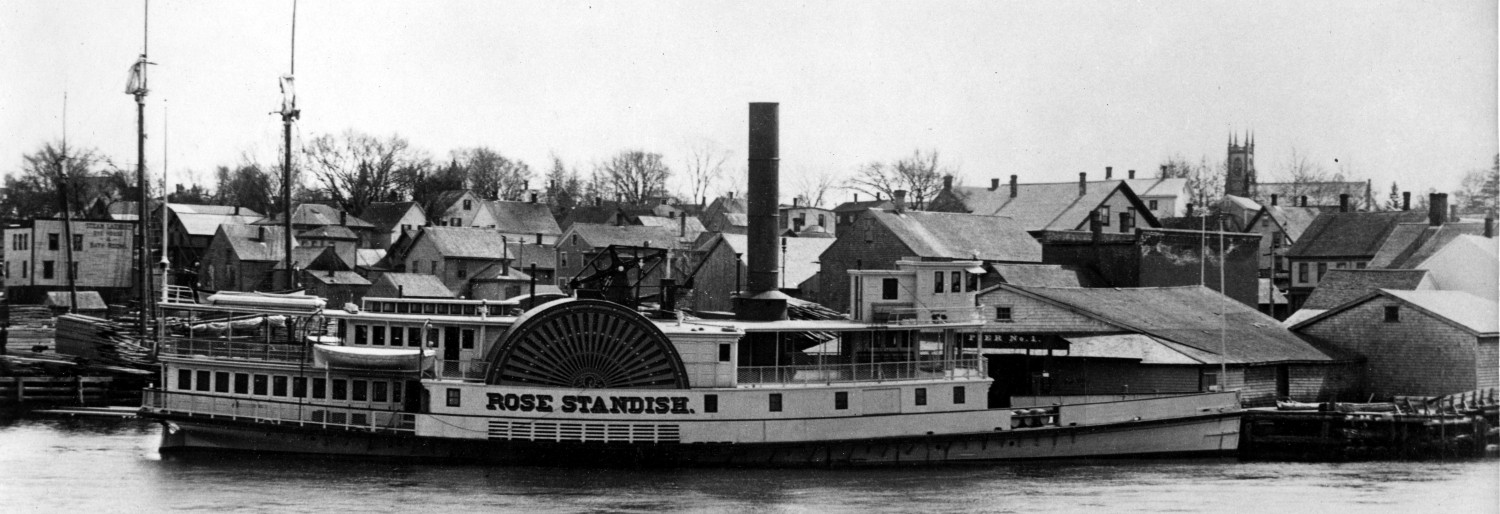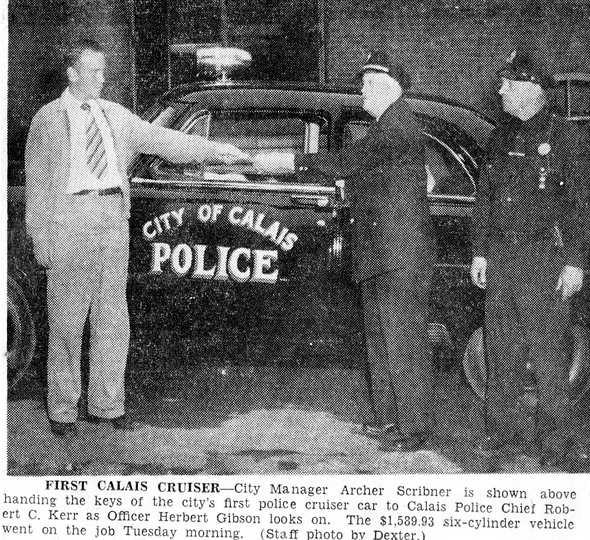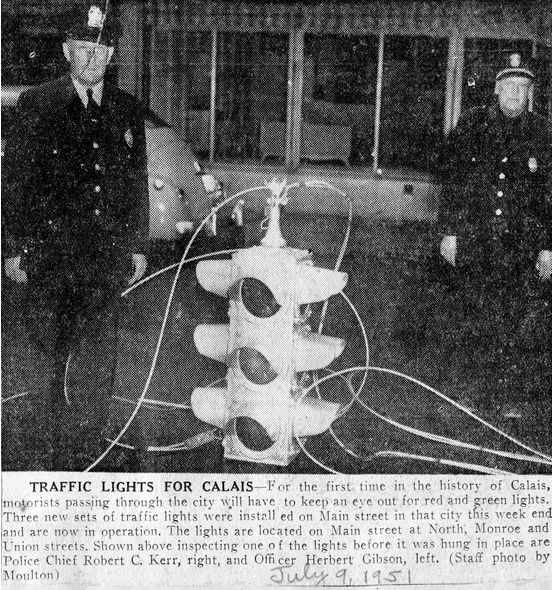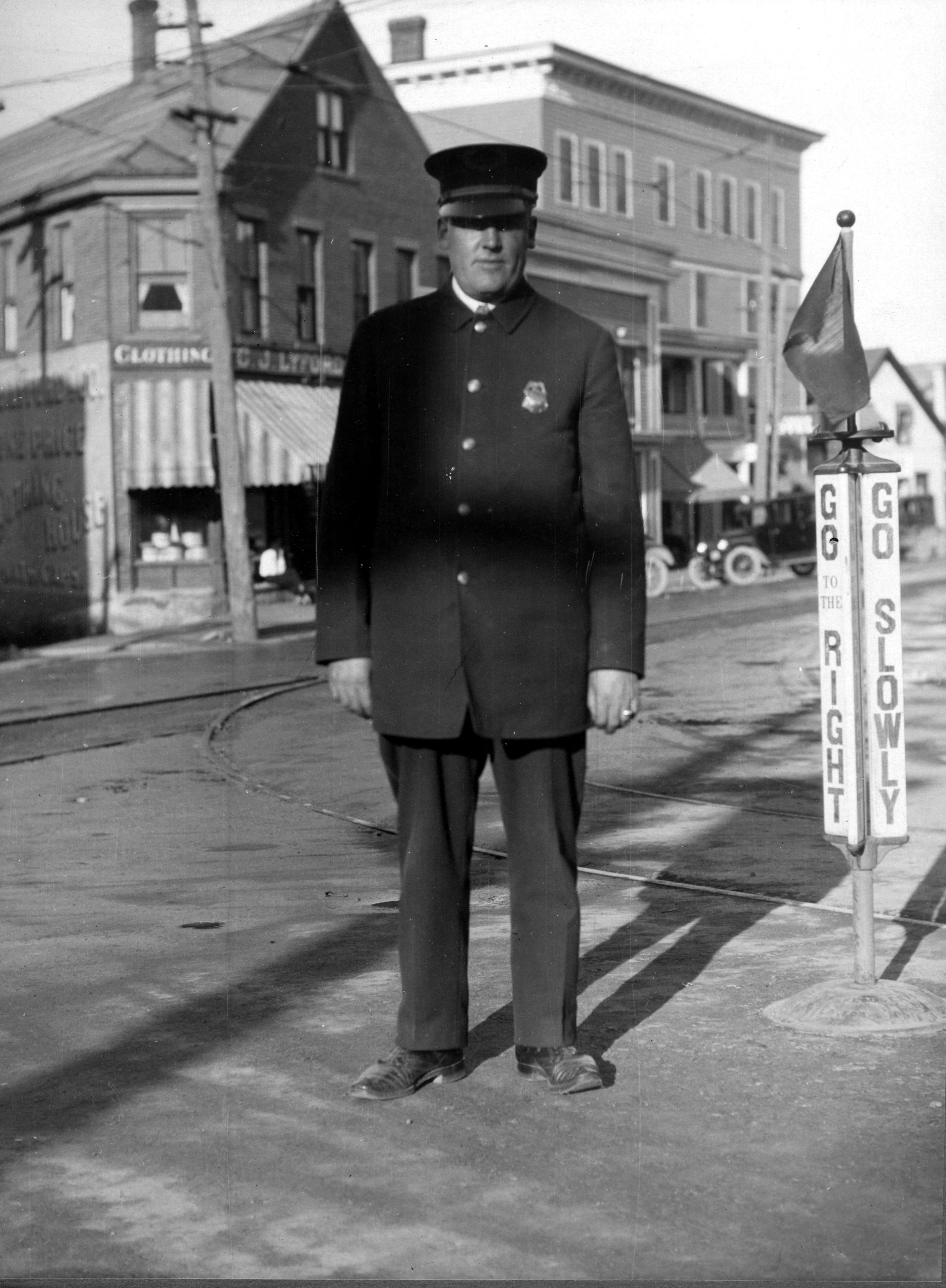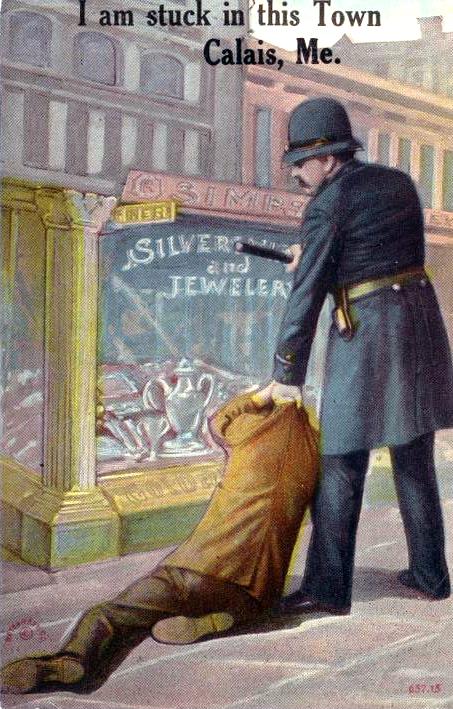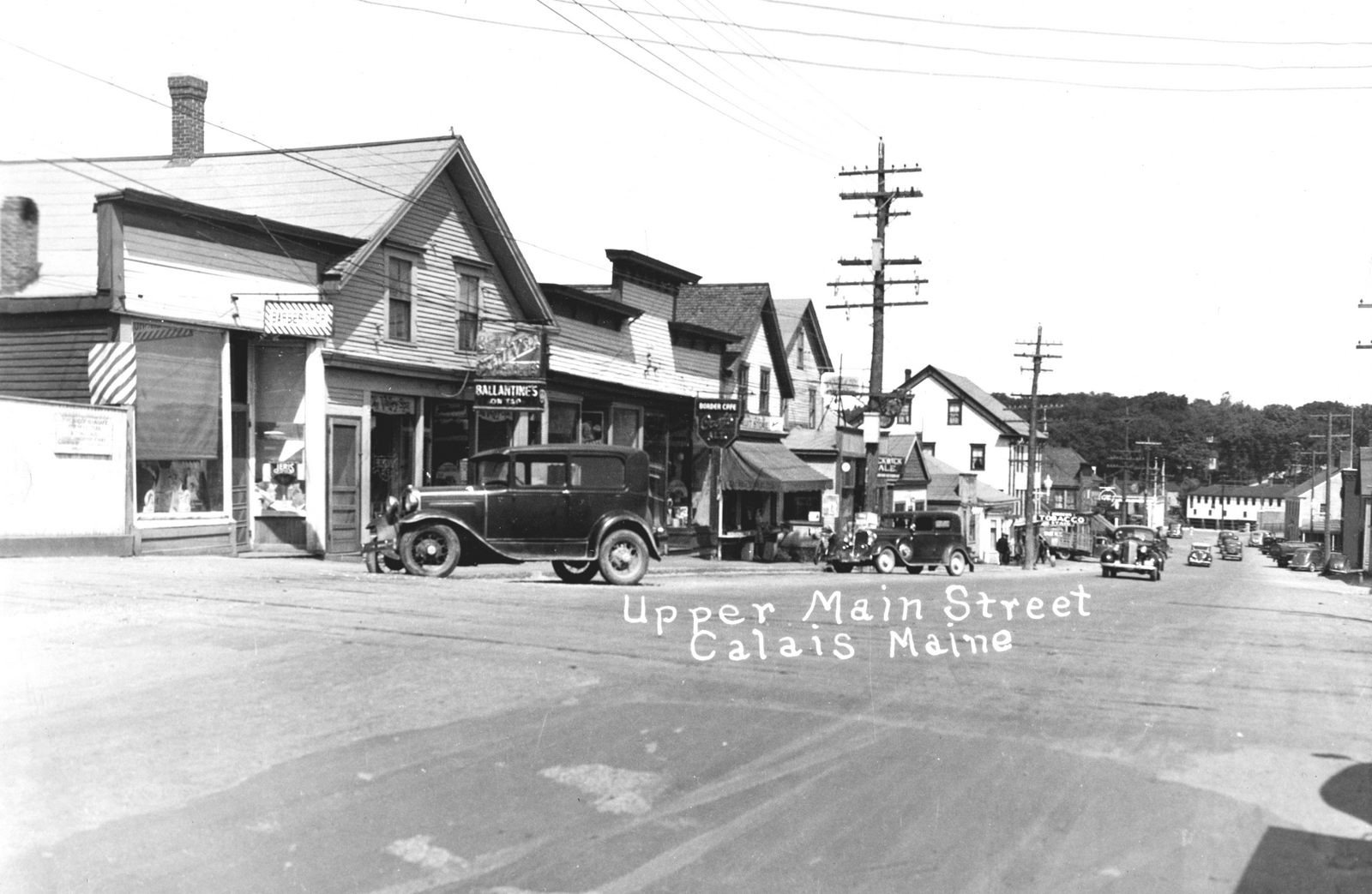
This 1930s photo of “Upper Main” Street Calais shows the businesses located on the part of Main Street from the corner of Union Street to the bridge back in the days after prohibition ended. A close inspection of these business discloses why Upper Main street was known in the days of prohibition as “Rum Row”. “Ballantine’s Ale” and “Pickwick’s Ale” was on tap and the Border Café selling an unknown brand of beer. Of course the bars of “Rum Row” had not stopped selling spirits and beer in 1919 with the advent of Prohibition but they were now able to again legally advertise what they been selling all along. Prohibition was a notional concept at best in Calais, especially in Irishtown and along Union Street. From its enactment in 1919 until its repeal in 1933 getting a drink was not a problem on Rum Row. This may have had something to do with that part of town’s proximity to the border and the fact that our City Marshall during the Prohibition, Bobby Kerr, was a lifelong resident of the Mud Lane section of Union Street, the epicenter of smuggling in the area during prohibition.
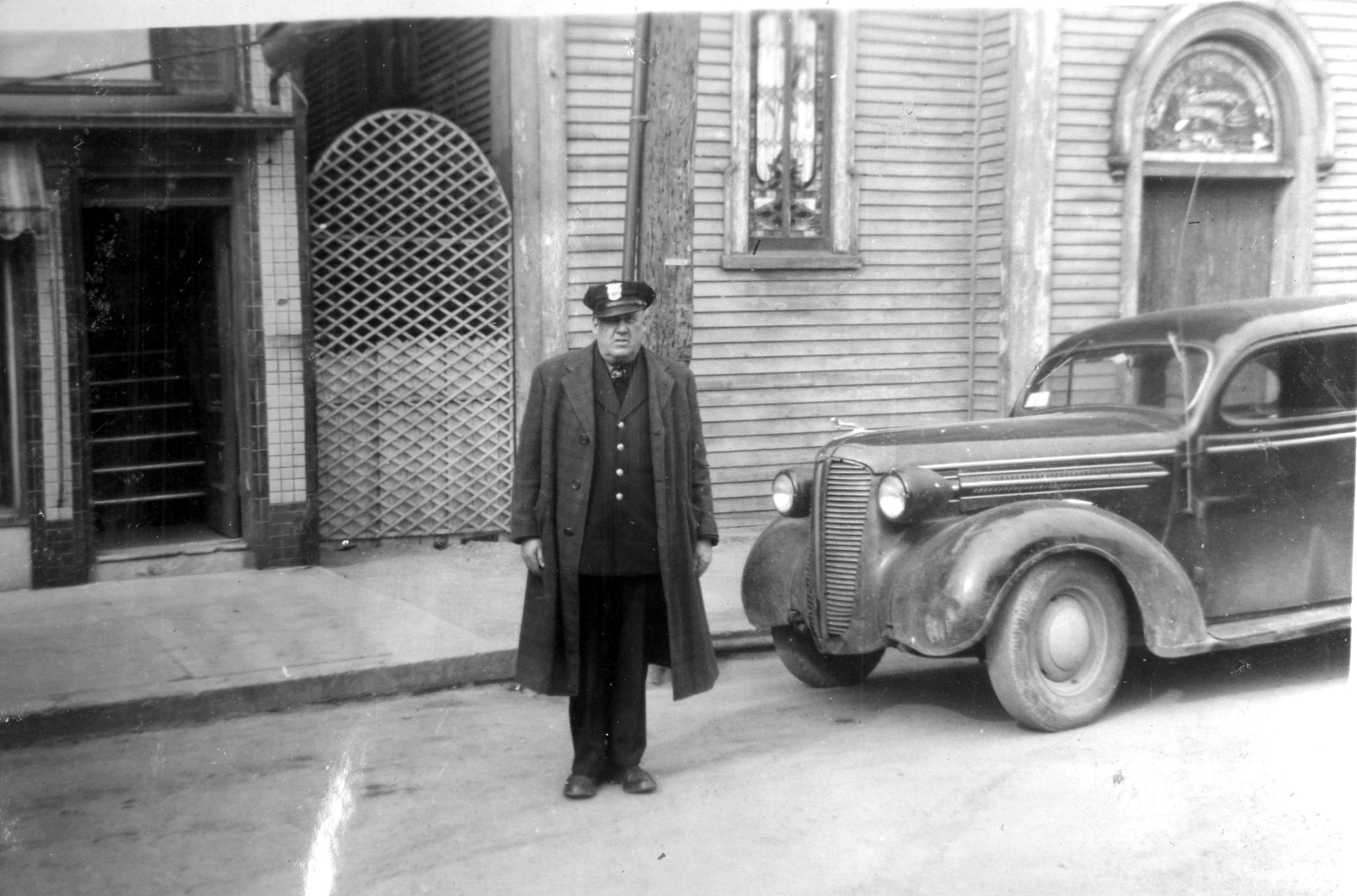
Norman Hill in his recollections of growing up in Calais described Bobby pretty accurately. Bobby is shown above in front of the Knight Memorial Church on Main Street:
As in any town there are characters that stand out. Calais had a few of them during my youth. One that I will always remember was the City Marshall, Bobby Kerr. He was a big person, in build and with authority. He always wore an overcoat over his uniform. His hat was cocked slightly sideways on his head. Many streets in town held a blue light on a pole to inform the local police if help was needed. The police didn’t have a patrol car to respond, so Marshall Kerr would hail the first car that came his way and demand the driver to take him the scene.
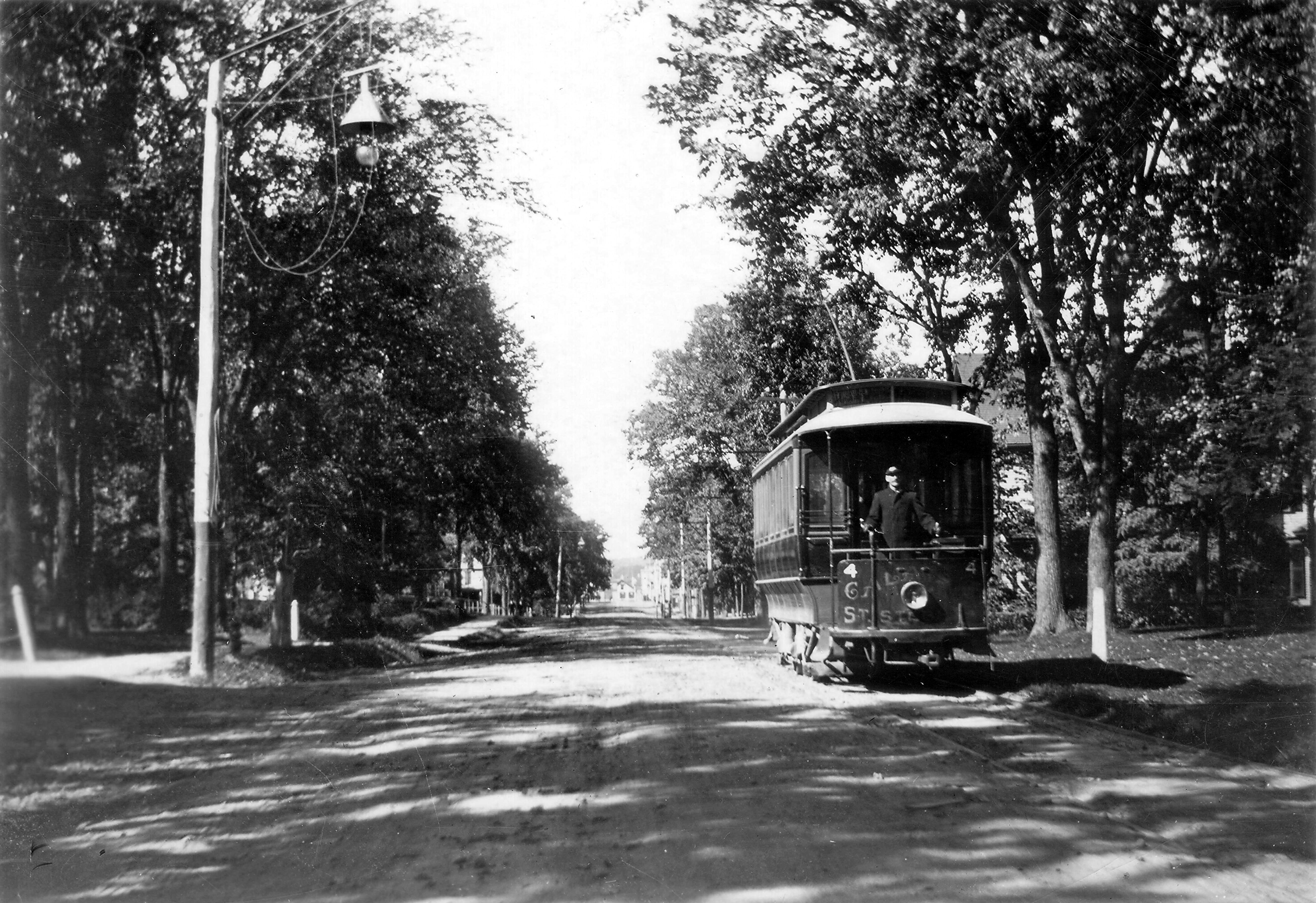
Bobby’s career as the “law” in Calais spanned 5 decades. From 1907-1919 Bobby and his brother Herbert were street car conductors. The conductor above may be well be either Bobby or his brother Herbert driving the streetcar up North Street near the intersection of High. According to Bobby “in 1919 I was yanked off the street, handed a badge and told to go to work.” From that day he was the City Marshall and later became Chief of the Police Department until he retired in 1953.
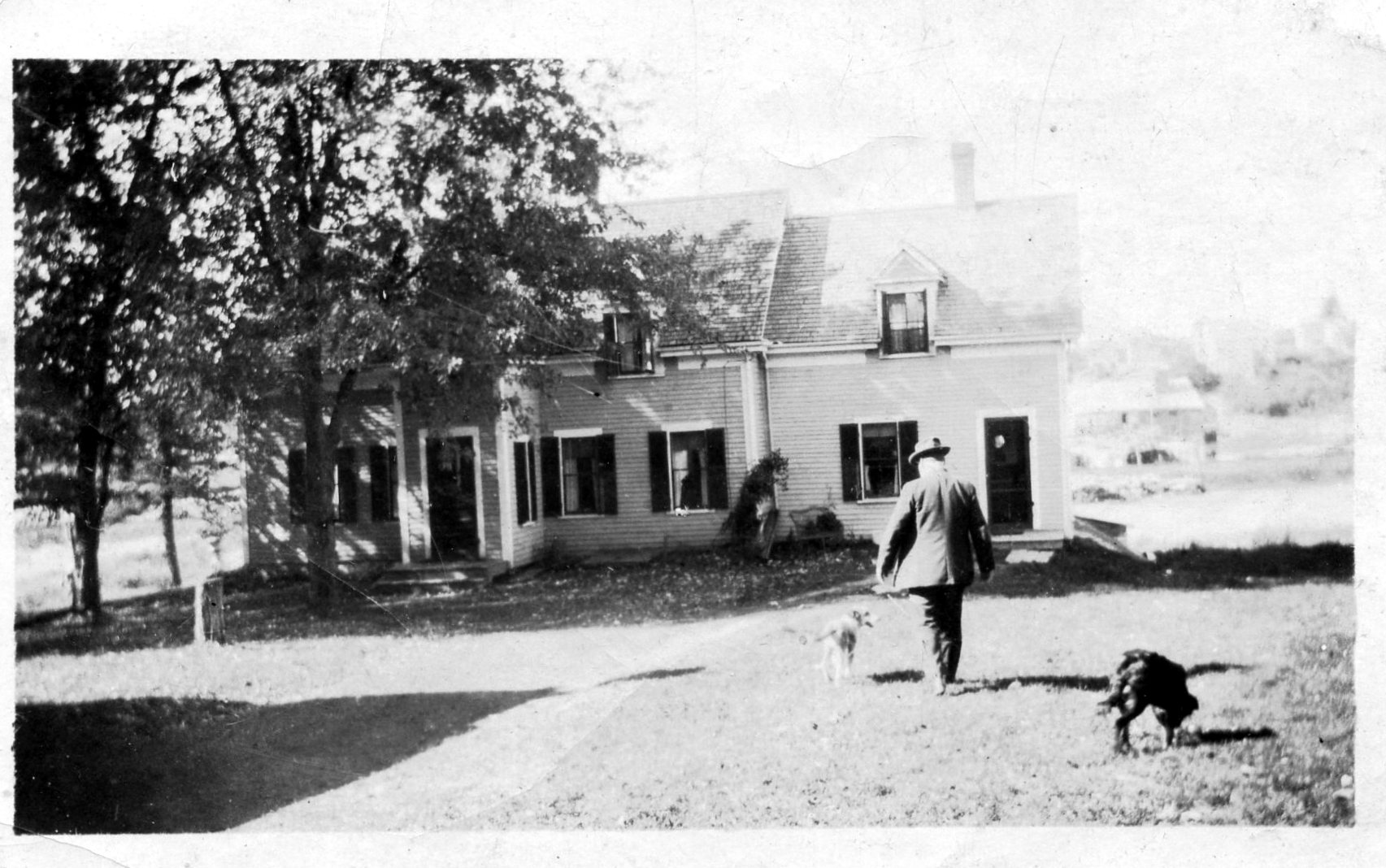
Louis Morrison, who was born in 1921, remembered Bobby well, perhaps too well. The Kerr family grew up in a house which still stands at the intersection of Pleasant and Union Streets. Louis also grew up in the Union and had a couple of uncles who were bootleggers. Almost all the bootleggers in those days lived in the Union. Louis remembers Bobby as tough but fair and says he was especially fair when it came to bootleggers. Enforcement of prohibition was not high on list of Bobby’s priorities, first because he was a Union boy himself and, second because most of the citizens of Calais were, shall we say, a bit ambivalent about this particular law. The Advertiser, which was a strong supporter of Prohibition, often editorialized that civic leaders, men who were usually the husbands of the women in the Women’s Christian Temperance Union, were either the biggest bootleggers or biggest customers of the bootleggers in the City. According to Louis Morrison pressure from the WCTU would
occasionally result in a call from the Governor to the Sheriff of Washington County demanding some action be taken against the bootleggers. As soon as Bobby got wind of the impending raid, the gin joints and speakeasys on Rum Row would suddenly go dry and would stay dry until the Sheriff had left town empty handed and the bootleggers got word the heat was off.
This is not to say Bobby was otherwise slack in his duties. On one occasion a local fellow claimed a band of “Gypsies” had stolen $80.00 from him. Bobby pursued the Gypsies all the way to Bangor “where they had temporarily set up a fortune telling place.” Apparently Bobby told the Gypsies their fortune if they didn’t cooperate and they coughed up the $80.00 which Bobby returned to the victim. The Advertiser often mentioned Bobby in a positive light which, given their divergent views on Prohibition, indicates that overall Bobby was a good cop. By the early 50’s Bobby was well beyond retirement age but he was a popular fellow in town. Even so the City was changing.
In 1951 Calais purchased its first police car and the first traffic light went up at the corner of Main and North. In 1953 the Council made a not very popular decision that it was time for Bobby to retire. It was remarked at his retirement ball in 1953 that “Where today the officers cruise around on smooth ribbons of road in a shiny, upholstered high speed vehicle, “Bobby” used to have to maneuver an “express wagon” hauled by two independent horses around the dirt roads, onto the wharves and through the fields, and usually dripping over the edges with men bound for jail.” The retirement ball was held at the Novilla with Biscuit Gilman’s orchestra providing the music. When he retired he was the oldest acting Chief of Police in the State.
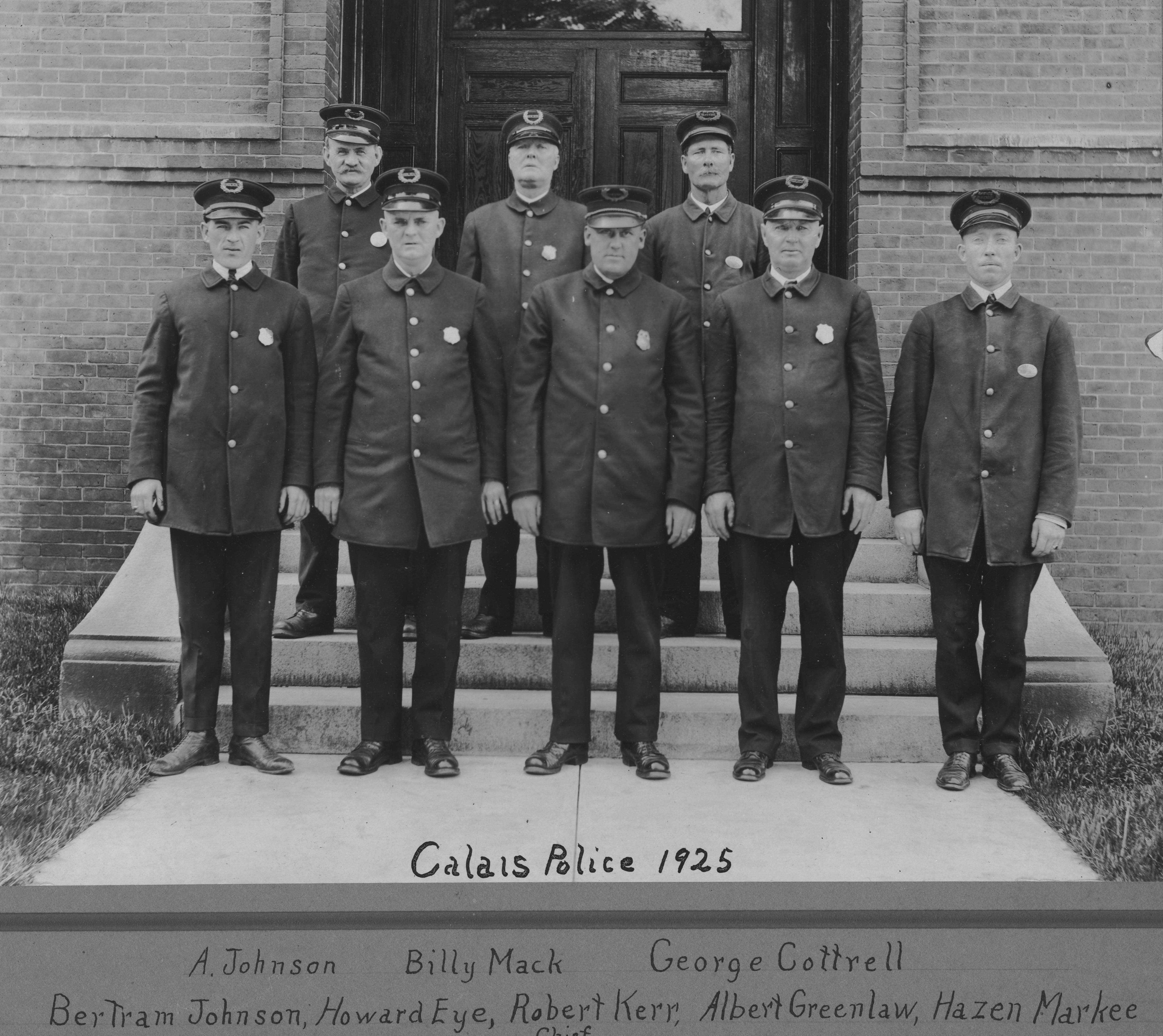
Bobby Kerr stories are not in short supply but the best were told by Sam Saunders, another boy from Mud Lane when describing the fellows in the photo above:
The way I recall, Scout Eye was the regular on the upper beat, Billy Mack was the regular on the lower beat, Ad Johnson was the regular at Milltown, and Bobby Kerr was the longtime Chief of Police. The others were spare or special officers, and George Cottrell was regular in Milltown after Johnson. Bobby Kerr (pronounced Carr, in Mudlane lingo) was Chief in Calais for a long time. He traded his Street Car Uniform in for the Police Uniform when the street cars went out. Many a Democrat had himself measured for the chief’s uniform before elections, but nobody could upset Bobby.
When Tom Bridges ran for County Attorney, he decked his car out with new brooms and used the slogan, “A New Broom Sweeps Clean”, and the Democrats countered with, “Honest Tom and Crooked Bob”. Bobby was a favorite with the citizens of Calais. Whenever he got excited, or an emergency arose, his favorite words were, “Geesus, Geesus, Geesus”. He was no Dick Tracy but not many crimes went unsolved during Bobby’s tenure. He had good contacts, and solved many a crime. Bobby didn’t earn big wages, but he was a man who believed in Santa Claus, and thought that Santa came every Saturday night, via the Calais Merchants. He also had the concession of feeding the prisoners, and got free taxi service, so he made out pretty well and if he needed anything, he would spread the word, and usually someone would come up with it. One morning while Bobby was feeding his prisoners, there happened to be a young lady in one of the cells, that had been detained overnight, and she said, “Bobby, I would like to have some Kotex.” Bobby replied, “You’ll have cornflakes, just like all the rest.”
We didn’t have dispatchers in those days, but the city had a very unique system. They had blue lights in strategic places, and when a call came into the fire station, they would snap on the lights, and an officer on the street would get to a phone, learn the cause of alarm, stop the first car along, and get to the scene of the crime pronto. It worked very well, and it was a hell of a lot cheaper than today.
Scout, Billy and Ad worked the night shift, and Bobby kept law and order during the day. On Saturday night Bobby worked and maybe a special or two. One would direct traffic at the Bank corner, while the others patrolled the Main Street. Cars would be going steady up North Street, across Lowell, down Monroe and down Main, looking for a chance to park in front of the chain stores. The smell of hot dogs and onions and of Louie’s peanuts filled the air, and Frank Beckett Sr. was busy weighing out candy and breaking the Honey Sticks in two to give you honest measure. And during all this, these trusted officers were maintaining peace in the St. Croix Valley.
I think the funniest thing I can remember about Bobby Kerr was away back one busy Saturday forenoon. I was working at the Border Transportation Co., on lower North Street, where busses came in from Eastport, Woodland and Princeton. This was also Bobby’s regular hangout, and this morning he and I were looking out the big window and shooting the bull, and this lady came in and used the restroom. When she came out, our backs were to her, and when she got out the door, we could see that in her haste, somehow, she had tucked the back of her dress inside of her bloomers. When Bobby saw what had happened he got all excited and shouted, “Geesus, Geesus, Geesus, Stop her, Stop her!”, and at the same time went out the door, hollering, “Mrs.! Mrs.! Mrs.!”. Well by the time he overtook her, they were in the middle of the intersection of North and Main and Bobby was talking to her, and at the same time trying to assist her and she was backing around and around in a circle, the traffic was held up, and some wise guy was laying on his horn, and by the time Bobby got her garments and the traffic straightened out, he was so flustered that he came back and bawled the hell out of me for letting it happen.
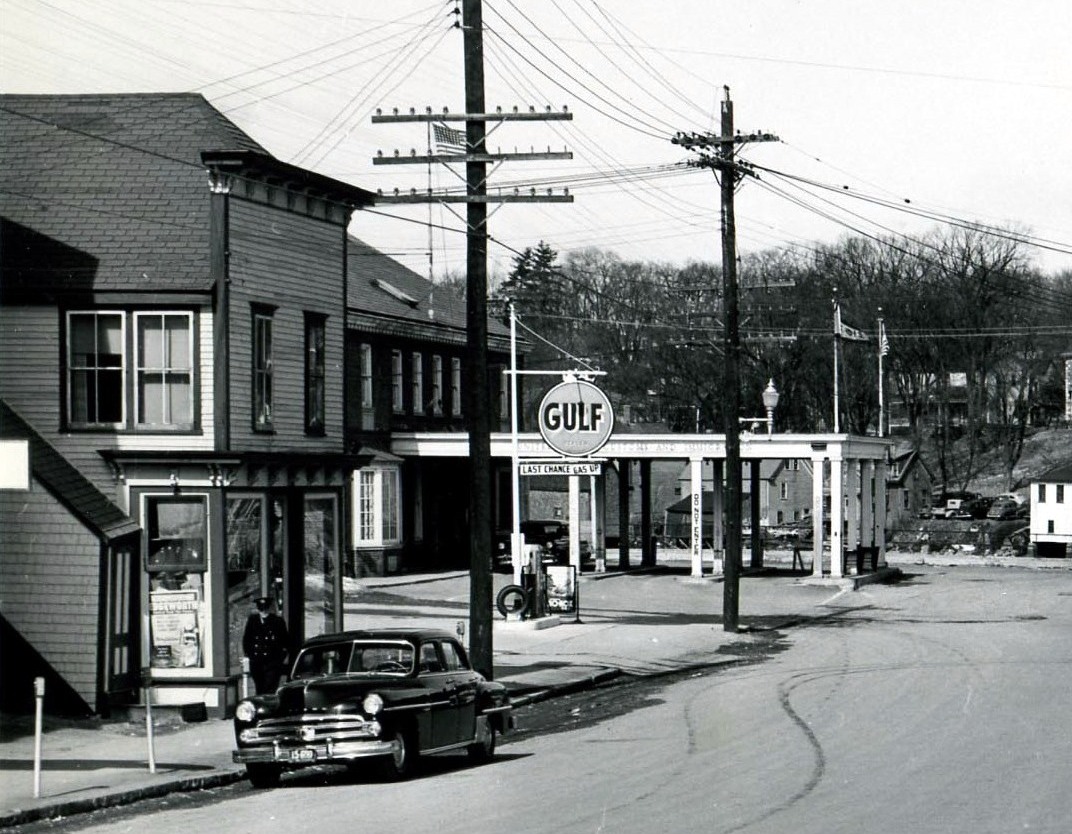
We’ll end with some more photos of Bobby Kerr. The above shows him walking up Main Street from the bridge. Even after the City bought a cruiser it spent most of its time parked behind the City Building. All the cops walked their “beat’ which made sense as they were also responsible for writing parking tickets. In the above photo Bobby seems to be eyeing the meter to see if he might be compelled to get out his ticket book.
Bobby at the corner of North and Main- before traffic lights. In the early days traffic control was achieved, not very successfully, with the sort of signs seen to the right in the photo. Mostly drivers ignored the signs.
We have early photos of Calais police officers wearing a “Bobbies” hat so perhaps in his early days Bobby Kerr was a model for this postcard.
